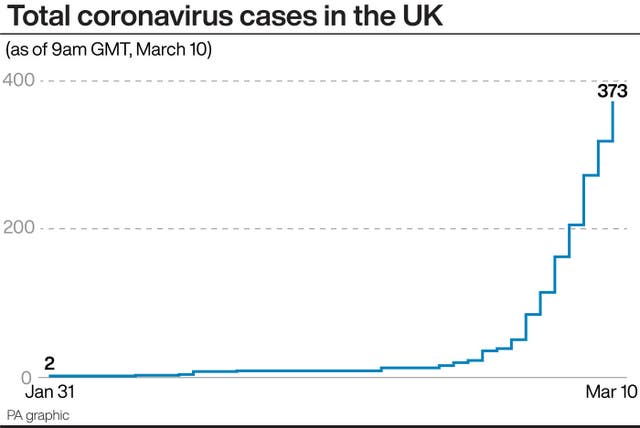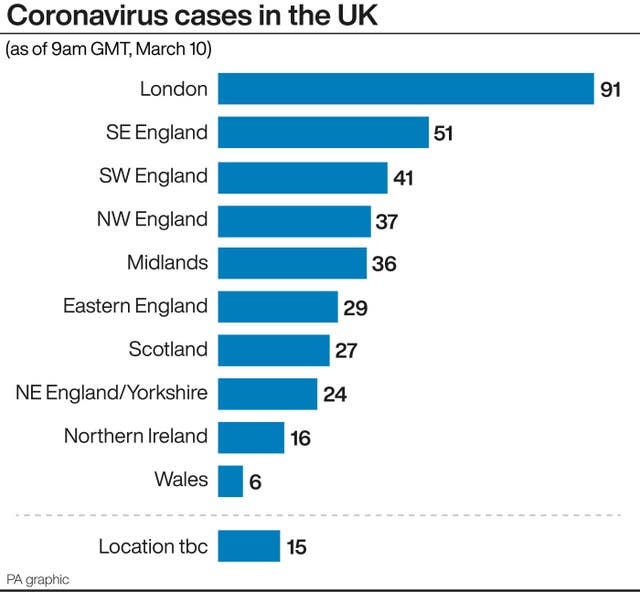
The start of the UK peak of the coronavirus epidemic is expected within the next fortnight, England’s deputy chief medical officer has said, as cases rose to 373 and a sixth death was announced.
Dr Jenny Harries defended the Government’s decision to delay closing schools and the introduction of other stringent tactics, saying experts are assessing new cases on an hourly basis to achieve a “balanced response”.
But new measures – including those aimed at protecting the elderly and vulnerable – are expected shortly as cases rise more rapidly across the UK.
Elsewhere:
– British nationals on the Grand Princess cruise ship at the Port of Oakland, California, will land in the UK on Wednesday and will go into self-isolation
– Health minister Jo Churchill said some patients can expect to wait longer for NHS treatment as doctors prioritise those with more serious illness and multiple underlying health conditions first
– Some air passengers have complained of being stranded in Italy after airlines including British Airways and Ryanair cancelled flights to and from Italy
– The Foreign Office said it was in contact with Britons in Vietnam after reports of nine new cases confirmed among travellers on board the same flight from London to Hanoi on March 2, including seven British citizens
– Health Secretary Matt Hancock said that “wherever clinically and practically possible, people can access and should access” GP appointments “through phones and digital means”
– There were no handshakes from the Queen as she held an audience at Buckingham Palace
– Trinity College Dublin and Harvard in the US said they were moving lessons online
– NatWest and Royal Bank of Scotland mortgage customers affected by coronavirus could get to defer repayments for up to three months
– A healthcare worker at Great Ormond Street was diagnosed with coronavirus, leading to the children’s hospital postponing all non-essential cardiac procedures for two weeks.

The latest figures show that 373 people in the UK are now confirmed to have Covid-19 as of 9am on Tuesday, up from 319 the day before, and six people have died in British hospitals.
The increase is the second biggest day-on-day rise, and mirrors Monday’s 17% increase.
The most recent patient death took place on Monday night at Watford General Hospital, part of West Hertfordshire Hospitals NHS Trust.
The patient, who is believed to have contracted the virus in the UK, was in their eighties and had underlying health conditions.
Earlier, Dr Harries said the vast majority of those diagnosed with coronavirus in the UK are “pretty well” but that they may “feel a bit rough for a few days”.

She added: “We can expect a peak in cases, it has a relatively slow take off at the start, that’s where we are at the moment, it will start to rise quite sharply.”
Asked when the rapid increase of infections might end, she said: “Within 10 to 14 days we will be likely to advise people with symptoms to self-isolate and we are expecting that start of the peak to come within that period.”
Staying at home in self-isolation would”extremely effective in trying to move our epidemic curve forward” towards warmer months, she added.
Dr Harries said cancelling big outdoor events like football matches would not necessarily be a decision supported by science.
“The virus will not survive very long outside,” she said. “Many outdoor events, particularly, are relatively safe.”
Speaking on Sky News, Dr Harries said “many thousands of people” would contract coronavirus as the disease continued to spread in the UK.
“Large numbers of the population will become infected because it’s a naive population – nobody has got antibodies to this virus currently,” she said.
“We will see many thousands of people infected by coronavirus, that’s what we’re seeing in other countries, and the important thing for us is to make sure that we manage those infections.”
Speaking on BBC Radio 4’s Today programme, she said GPs would only visit sick people self-isolating in their own homes if absolutely necessary, due to the fact it is an infectious disease.
She added: “Generally we expect nearly all of these patients to be fine at home, and we are working to ensure, if they need, the few that become seriously ill, to get into hospital, there will be quick mechanisms for them to do that.”
The comments come as Italy extended coronavirus travel restrictions to the whole country on Tuesday, with soldiers and police enforcing the bans.
Overall, Italy has recorded 9,172 cases of Covid-19, with 463 deaths, and figures expected to rise.
Here's what you can do to protect yourself and others from coronavirus:
▶️ Wash your hands more often▶️ Use soap and water for 20 seconds▶️ Or use hand sanitiser
Watch our video guide below on how to wash your hands properly 👇#coronavirus | #COVID19 pic.twitter.com/rZnzEPzkOz
— Department of Health and Social Care (@DHSCgovuk) March 9, 2020
The Foreign and Commonwealth Office (FCO) in the UK amended its advice to warn against all but essential travel to Italy.
Public Health England (PHE) said anyone flying back to the UK from Italy – and those returning from the US cruise ship – would be told to self-isolate at home if they have no symptoms.
Anyone who is unable to do so will be offered accommodation but people will not officially be put into quarantine, and will only receive medical attention if they are ill.
Those without symptoms will make their own way home, including via public transport if needed, with PHE regarding the risk of this approach to the general public as “moderate”.
Anyone with symptoms during the flight will be asked to make themselves known to airline crew so that that they can be assessed by PHE port health teams.
On Monday, England’s Chief Medical Officer, Professor Chris Whitty, said Britons with cold, flu or fever symptoms could soon to be asked to stay at home in self-isolation.
For most people, coronavirus causes only mild or moderate symptoms, such as fever and cough, but for some people such as the elderly or those with underlying health problems, it can cause more severe illness, including pneumonia.
Prof Whitty said the balance would tip so that more and more people would suffer coronavirus rather than regular seasonal flu or other respiratory infections.


Comments: Our rules
We want our comments to be a lively and valuable part of our community - a place where readers can debate and engage with the most important local issues. The ability to comment on our stories is a privilege, not a right, however, and that privilege may be withdrawn if it is abused or misused.
Please report any comments that break our rules.
Read the rules here